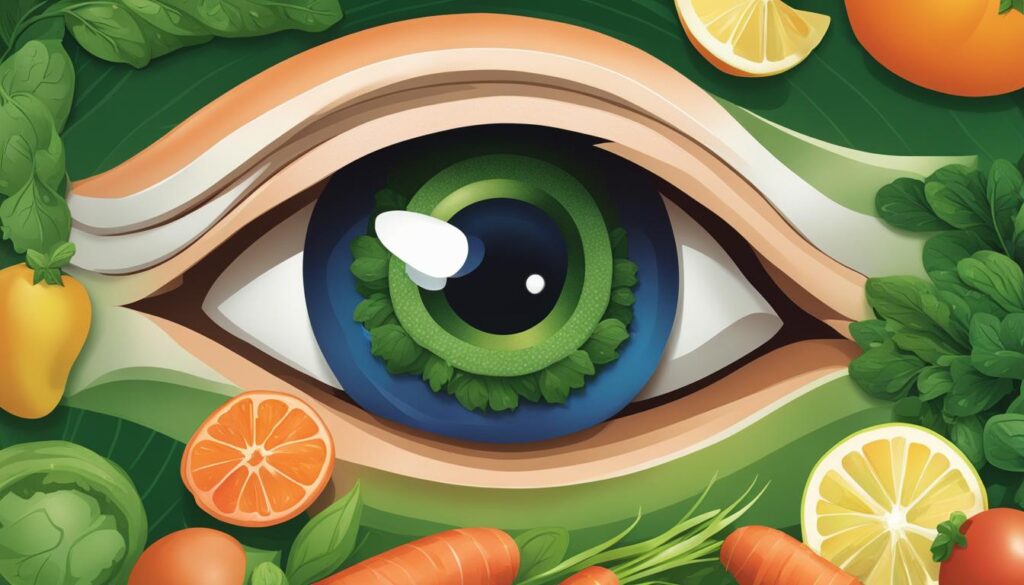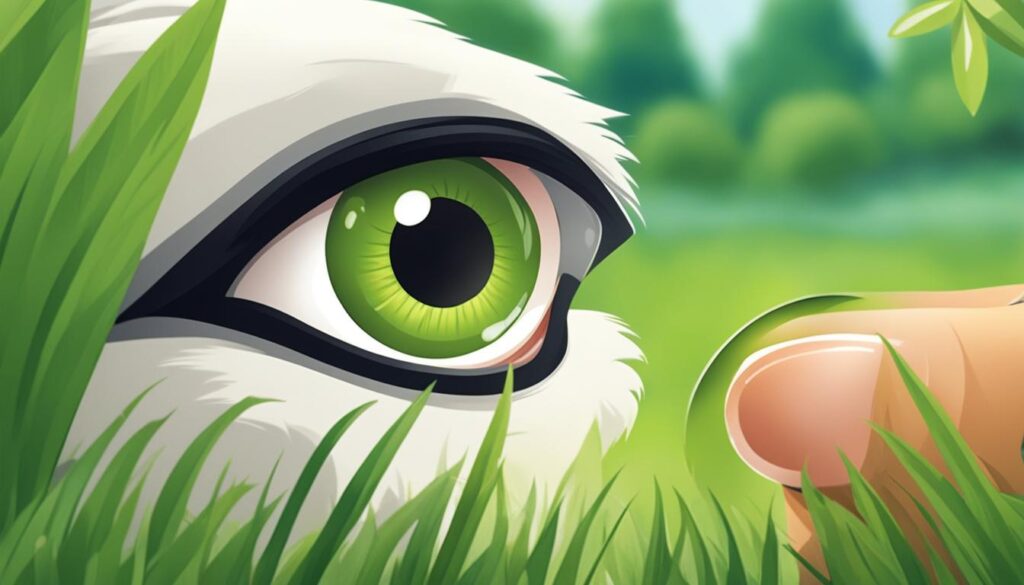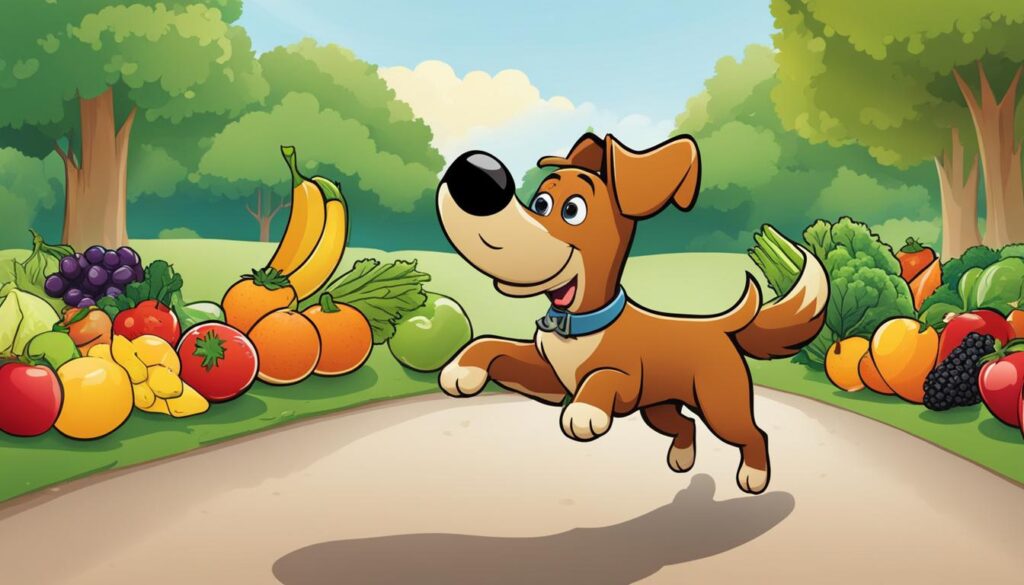As a dog owner, you want your furry friend to live a long and healthy life. One essential aspect of your pet’s health that you may not consider is their eye health. Taking care of your dog’s eyes is crucial for promoting healthy vision in dogs. This is where dog nutrition for eye health comes into play.
Proper nutrition plays a vital role in maintaining eye health in dogs. With the right nutrients and dietary considerations, you can support your dog’s vision and prevent eye diseases in dogs. In this comprehensive guide, we will discuss everything you need to know to ensure your pet’s eyes stay healthy and bright.
Understanding Canine Eye Health
As a pet owner, it’s important to prioritize your dog’s eye health to prevent eye diseases in dogs. Understanding the essential nutrients for dog’s eyes and preventative measures will ensure that your furry friend has a lifetime of healthy vision.
Pet eye care involves routine check-ups with your veterinarian, proper cleaning, and attention to your dog’s diet. Some of the most common eye diseases in dogs include cataracts, glaucoma, and cherry eye.
| Common Eye Diseases in Dogs | Preventative Measures |
|---|---|
| Cataracts | -Maintain a healthy diet rich in antioxidants and omega-3 fatty acids -Manage underlying health conditions such as diabetes -Avoid exposing your dog to UV radiation |
| Glaucoma | -Regular check-ups with your veterinarian -Avoid using medications that can increase eye pressure -Maintain a healthy diet -Surgery may be necessary in severe cases |
| Cherry Eye | -Surgery is usually necessary -Avoid rubbing or touching your dog’s eyes -Regular check-ups with your veterinarian |
Eating a balanced and nutritious diet is vital for promoting healthy vision in dogs. Incorporating foods rich in essential nutrients for dog’s eyes, such as omega-3 fatty acids, vitamin C, and vitamin E, can help prevent eye diseases in dogs and support long-term eye health.
Pet eye care can also include regular eye cleaning to remove any environmental debris and prevent infection. This can be done using a damp cloth or veterinarian-approved cleaning solution. And if you notice any signs of a potential problem, such as redness, discharge, or squinting, it’s crucial to seek veterinary assistance right away.
By understanding essential nutrients for dog’s eyes and preventative measures for canine eye health, you can help ensure that your furry friend has clear and bright eyes for years to come.


Key Nutrients for Dog Eye Health
A balanced diet that includes the right nutrients is essential for maintaining your dog’s eye health. Here are the key nutrients that your furry friend needs for optimal vision:
| Nutrient | Benefits | Food Sources |
|---|---|---|
| Vitamin A | Helps prevent night blindness and dry eyes | Liver, sweet potato, carrots, spinach |
| Vitamin C | Protects against cataracts and oxidative damage | Broccoli, bell peppers, oranges, strawberries |
| Vitamin E | Helps prevent cataracts and other eye diseases | Sunflower seeds, almonds, spinach, avocado |
| Omega-3 fatty acids | Anti-inflammatory properties can help prevent eye diseases | Salmon, sardines, flaxseeds, chia seeds |
| Zinc | Supports the health of the retina and helps prevent night blindness | Beef, pork, pumpkin seeds, lentils |
Keep in mind that the best dog food for eyes is one that is rich in these nutrients. When shopping for dog food, look for brands with high-quality ingredients and without harmful additives or preservatives.
In addition to feeding your dog a well-balanced diet, consider supplementing their meals with a multivitamin to ensure they are getting all the essential nutrients. Always consult with your vet before adding any supplements to your dog’s diet.


Dietary Recommendations for Healthy Eyes
Promoting healthy vision in dogs relies heavily on their diet. Feeding your furry companion a balanced and nutritious diet is essential for maintaining optimal eye health. Here are some dietary recommendations to consider:
| Food | Description |
|---|---|
| High-quality protein | Choose dog food that contains high-quality protein, such as chicken, fish, and lamb. Protein is essential for maintaining healthy eye tissues. |
| Fruits and Vegetables | Incorporate fresh fruits and vegetables into your dog’s diet. Carrots, broccoli, and sweet potatoes are rich in vitamin A, which is important for healthy eyesight. |
| Omega-3 Fatty Acids | Include foods that are rich in omega-3 fatty acids, such as salmon, sardines, and flaxseed. Omega-3 fatty acids can help reduce the risk of age-related eye diseases. |
In addition to choosing the best dog food for eyes, providing clean and fresh water is also crucial for maintaining optimal eye health in dogs.
Remember to consult with your veterinarian before making any significant changes to your dog’s diet. They can provide personalized recommendations based on your dog’s specific health needs.


Natural Remedies for Dog Eye Health
If you’re looking for natural ways to support your dog’s eye health, there are several remedies you can try. Incorporating these into your pet’s routine may help support their vision and prevent future issues. Here are some natural remedies for dog eye health:
Herbal Supplements
Herbal supplements can provide a wealth of benefits for your dog’s overall health, including their eyes. Some popular herbs for eye health include:
- Bilberry – supports visual acuity
- Milk Thistle – supports liver function, which can help improve eye health
- Fennel – may have antioxidant properties to support eye health
Be sure to talk to your veterinarian before giving your dog any herbal supplements, as they can interact with medications or cause allergic reactions in some dogs.
Eye Drops
There are eye drop solutions made specifically for dogs that can help soothe and support eye health. Look for drops made with natural ingredients, such as aloe vera or chamomile. These can help alleviate redness, irritation, and dryness.
Warm Compresses
If your dog has red, irritated eyes, a warm compress may help soothe them. Soak a clean, damp cloth in warm water and gently hold it against your dog’s closed eye for a few minutes. Repeat this process a few times a day to reduce inflammation and promote healing.
Dietary Changes
Incorporating certain foods into your dog’s diet can also support eye health. Foods rich in vitamin A, such as carrots and sweet potatoes, help support retinal health. Omega-3 fatty acids found in fish oils can also help reduce inflammation and support eye health. Consider adding these foods to your dog’s meals to promote healthy vision.
Remember, while natural remedies can be beneficial, they should not be used as a substitute for veterinary care. If your dog is experiencing persistent eye issues, it is essential to seek the advice of your vet.


Routine Eye Care for Dogs
You can maintain your dog’s eye health by providing regular care and attention. When you clean your dog’s eyes regularly, you can detect any potential issues early and prevent them from escalating into more severe problems. You can also support your dog’s eye health by ensuring they receive a balanced diet rich in essential nutrients.
To clean your dog’s eyes, use a damp cloth or cotton ball to carefully wipe away any debris or discharge. Be sure to use a fresh area of the cloth or cotton ball for each eye to prevent spreading infection. If your dog’s eyes appear red or swollen, or if you notice any unusual discharge, contact your veterinarian immediately.
Regular check-ups with your veterinarian can help to detect any underlying issues early and provide prompt treatment. Your veterinarian may recommend routine eye exams or testing for hereditary eye diseases if your dog breed is prone to them. By staying on top of your dog’s eye health, you can help protect their vision and ensure they enjoy a long and happy life.
It’s also essential to protect your dog’s eyes from environmental irritants and potential injuries. When your dog is outside, keep them away from any areas where debris or chemicals may be present. Consider using dog goggles to protect your pet’s eyes during activities such as swimming or hiking in areas with high wind or dust.
Regular exercise and mental stimulation can also contribute to maintaining your dog’s overall health, including their eye health. Ensure your pet receives plenty of opportunities to play and explore, and provide toys and puzzles to keep them mentally stimulated. A happy and healthy dog is more likely to have clear and bright eyes for years to come.


Lifestyle Factors and Eye Health
Did you know that certain lifestyle factors can impact your dog’s eye health? As a pet owner, there are steps you can take to promote healthy vision in your furry friend. Consider the following:
- Protect your dog’s eyes from the sun by providing shade and avoiding prolonged exposure during peak hours. You can even buy special dog sunglasses or goggles to protect their eyes during outdoor activities.
- Keep your dog’s environment free of irritants like dust, smoke, and chemicals that can cause eye irritation or infection.
- Regular exercise and mental stimulation can promote overall wellness, which can contribute to maintaining healthy eyes.
By taking these steps to promote healthy vision in your dog, you can help prevent eye problems and ensure that your furry friend enjoys clear and bright eyes for years to come.


Conclusion
By implementing the strategies outlined in this guide, you can promote healthy vision for your furry friend. Remember that proper nutrition, regular eye care, and a well-rounded lifestyle all contribute to maintaining your dog’s eye health. Don’t forget to consult with your veterinarian for personalized recommendations based on your dog’s specific needs and health conditions.
With a little bit of effort and attention, you can unlock the power of dog nutrition for eye health and enjoy many years of clear and bright eyes with your beloved pet.
FAQ
Why is proper nutrition important for my dog’s eye health?
Proper nutrition is essential for maintaining your dog’s eye health because certain nutrients, such as antioxidants and omega-3 fatty acids, play a vital role in promoting healthy vision. By providing a balanced diet rich in these nutrients, you can help support your dog’s eye health and prevent vision problems.
What are some common eye diseases in dogs?
Common eye diseases in dogs include cataracts, glaucoma, dry eye, and cherry eye. These conditions can cause discomfort and vision impairment in your furry friend. Regular check-ups with your veterinarian and proper nutrition can help prevent and manage these eye diseases.
Which nutrients are crucial for my dog’s eye health?
Key nutrients for dog’s eye health include antioxidants such as vitamin C and E, omega-3 fatty acids, zinc, and lutein. These nutrients help protect the eyes from damage caused by oxidative stress and support overall eye function. You can find these nutrients in certain foods or consider nutritional supplements specifically designed for eye health.
What should I feed my dog to promote healthy eyes?
To promote healthy eyes, feed your dog a balanced diet that includes high-quality dog food formulated with essential nutrients. Look for dog foods that contain antioxidants, omega-3 fatty acids, and other key nutrients for eye health. Additionally, incorporating fresh fruits and vegetables into your dog’s diet can provide additional benefits for eye health.
Are there natural remedies to support my dog’s eye health?
Yes, there are natural remedies that can help support your dog’s eye health. Herbal supplements like bilberry extract and eyebright can provide antioxidant benefits and promote eye health. Additionally, some natural eye drops or rinses can help soothe and cleanse your dog’s eyes. Consult with your veterinarian before using any natural remedies.
How do I properly clean my dog’s eyes?
To clean your dog’s eyes, use a clean, damp cloth or gauze pad and gently wipe away any discharge or debris. Be careful not to touch or irritate the eyes. If you notice persistent discharge, redness, or other signs of discomfort, consult your veterinarian for further evaluation and guidance.
What lifestyle factors can impact my dog’s eye health?
Certain lifestyle factors, such as protecting your dog’s eyes from sun exposure and environmental irritants, regular exercise, and mental stimulation, can contribute to maintaining healthy vision. Avoid exposing your dog to harsh sunlight, provide appropriate eye protection when necessary, and engage them in activities that promote overall well-being.
Should I consult my veterinarian for personalized recommendations?
Absolutely. Every dog is unique, and their specific needs and health conditions may require personalized recommendations. Consulting with your veterinarian will ensure that you receive tailored guidance on dog nutrition for eye health and any other aspects of your dog’s overall well-being.

